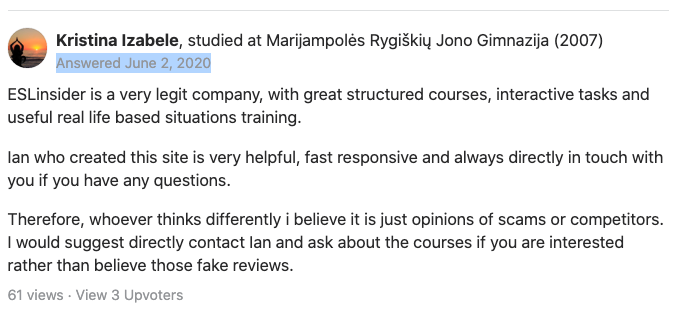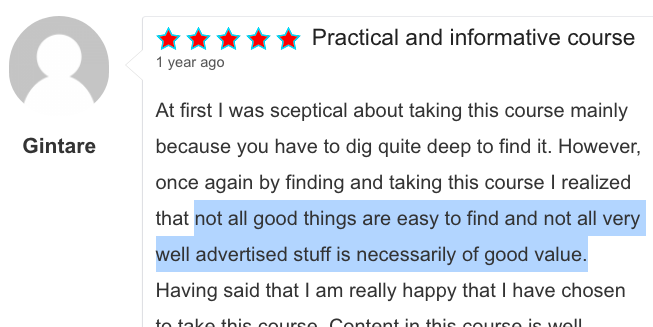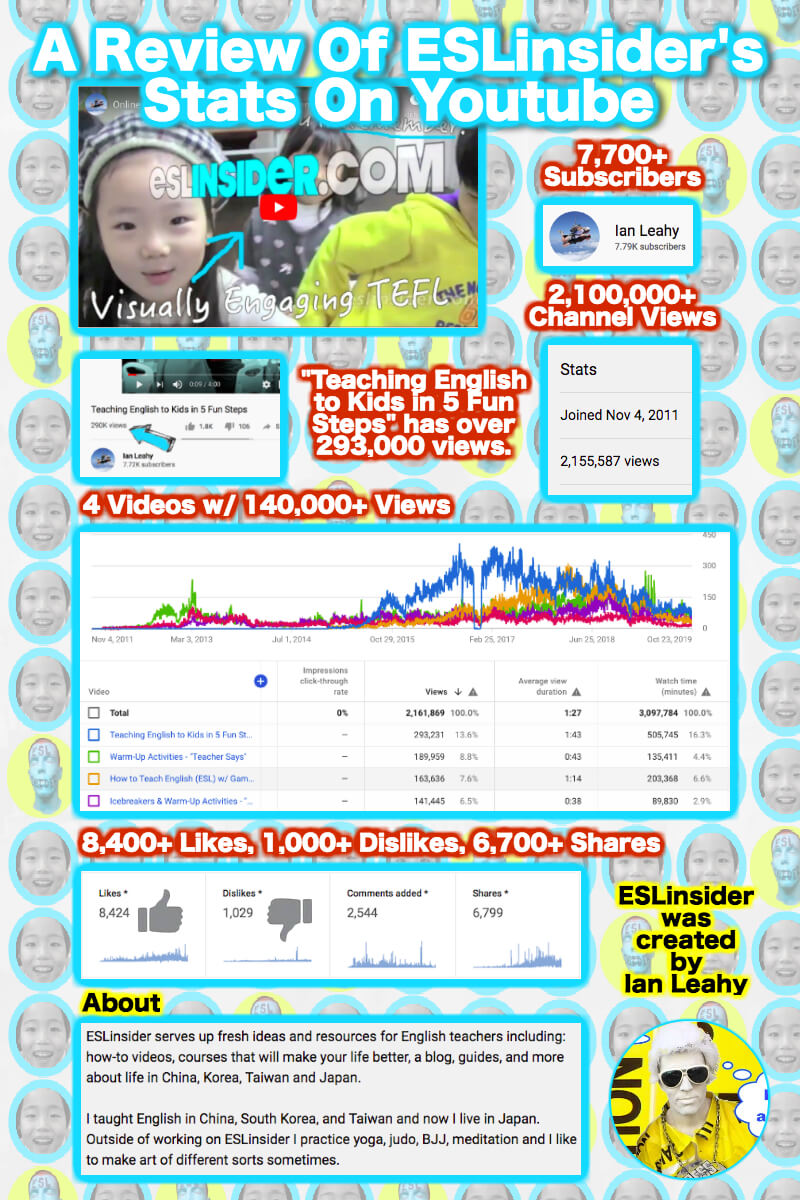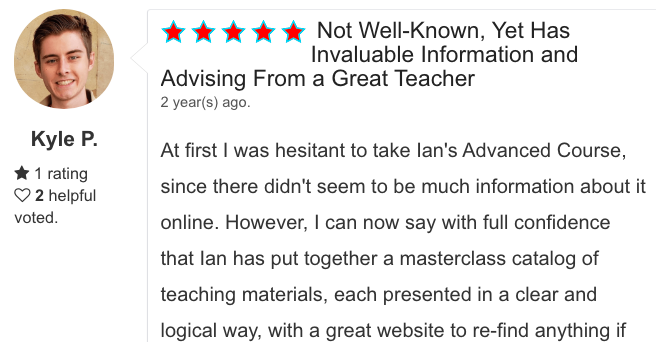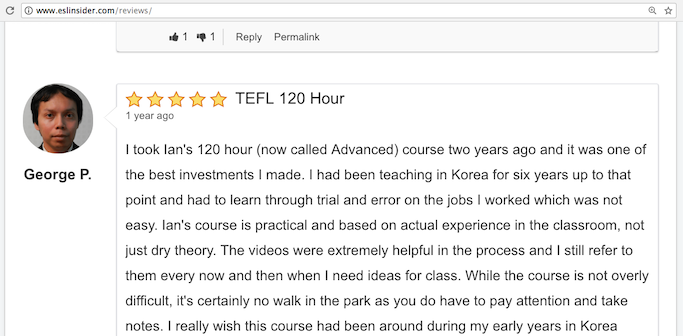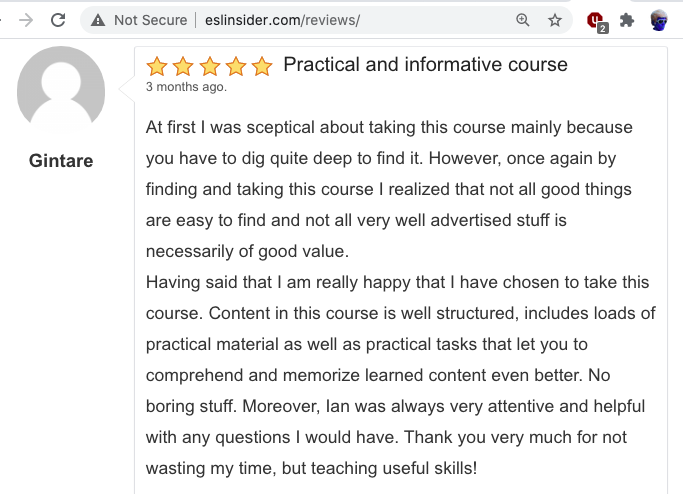I am thinking out loud here. I recently made a change to my site and am in the process of updating and upgrading my course to improve it. And I removed the certificate.
Why?
Because everyone is just after the certificate. They are in it for the wrong reasons.
They are chasing the carrot.
Sure some of them may need it for a job, but the certificate doesn’t mean much. And that is why more and more people are saying just get the cheapest one.
They are in it for the wrong reasons.
They don’t realize what they are getting into.
But why should they take my course that doesn’t have a certificate when they can take another course that gives them a certificate?
Why?
They have to have a really good reason to do that.
Here are my reasons:
- Short practical instructional videos – watching other teachers is the easiest way to learn how to teach period. Although it does of course matter who the teacher is.
- Feedback. It’s a live course with feedback on assignments from me – someone with years of experience teaching in China, Korea and Taiwan. Oh, and I live in Japan now.
- It’s targeted towards teaching children (especially in Asia). Why does that matter? Because most courses out there actually focus more on teaching adults. I took one of those courses – actually 2 of those courses and I can say that they weren’t very helpful for that.
- Personality development. Many of the improvements that I am working on now are in this department. Teaching abroad is an experience and it’s not only a job. So how can people take that experience and make it a life transforming one?
Another reason is I give them long term access. Apparently scarcity sells and giving people short term access sells, but what happens when you take a course when you haven’t even started teaching yet, complete it, go abroad, jump in the classroom and start teaching and then realize oh man this is difficult what did that course saying about teaching vocab?
Or maybe how was I supposed to deal with these kids speaking in another language? Did it say anything about that? I don’t think it did.
So what I am supposed to do with that.
The experience with the courses I took had a very weak classroom management section. Teaching kids is not simple. You are going to need some skills and classroom management is one and “positive reinforcement” only goes so far.
Now how am I going to make money from this course without a certificate?
I removed the bait.
I guess it’s not for everyone and there are fewer people now that will be interested just based on that. So that’s partly why I raised the price and am adding value to it.
How am I going to make money from this course without a certificate?
Maybe if I targeted licensed teachers as they already have a qualification that’s considered higher than TEFL certification. AND they are more of the higher performance types compared to many of the low performers who are just looking for a job.
How would I reach them?
Who else?
Experienced teachers? Some experienced teachers have taken my courses, but were they taking the course to learn or get a qualification? IDK.
But some experienced teachers think that they don’t need it.
What about new teachers?
Maybe new teachers would be less likely to take a course without a certificate. They’re looking for a job and very unfamiliar with the territory.
Why would they pay more for a course that gives them less? No, it’s not less it’s more but there’s no certificate.
Do people assume that all TEFL or TESOL courses are the same? I think some of them do as you have seen on Reddit. That’s why they say get the cheapest or a CELTA.
There is CELTA and there are all the others. So they think.
Some people think courses are the same. I think many are actually too. How can they know the difference? You have to show and tell a different story.
What’s the value of this?
Why have you removed the certificate?
The value is the learning. The value is in the process. If you are seeking a fix to your solutions then a certificate is probably not the answer.
Wait. Maybe I am wrong.
Because if they want a job that requires certification then a certificate is a solution.
But what kind of solution is it?
It’s a short term solution.
Why?
BECAUSE GETTING A JOB IS JUST THE BEGINNING.
I don’t think they get that.
Why not?
Because maybe they are not abroad and they are not teaching so they have zero context or knowledge of what they are getting theirselves into.
It’s abstract. Teaching is not yet a real thing.
So then maybe you should sell to people who are abroad and leave a note for those to remember you when they get abroad and start teaching.
Why take your course and not another?
I mentioned the video, the feedback which also enables them to use their materials.
They have there eyes set on their problem which is getting a job and getting abroad. Hence why they want an “accredited TEFL certificate”.
They want the security even if it’s all for show. They don’t know that. “Hours” like that famous, lol 120 hour TEFL course are fake but they don’t know. Accreditation is for show. A certificate is for show.
So you can’t compete with that.
So what do you do?
Maybe you should try to get people who have already started. Instead of trying to persuade people who haven’t go for people who have.
Figure out who you are talking to.
Getting a job is just THE BEGINNING. But that is all they are focused on. So IDK. Maybe focus on those that have started. But are those people looking for courses?
IF YOU NEED A CERTIFICATE AND A JOB THEN THIS COURSE IS PROBABLY NOT FOR YOU
At least not now…
Maybe this is a way to separate the people who are looking for a cert. and the people who are looking for a job.
Maybe they will remember you for later. Maybe. So who do I talk to? Maybe it’s better for people who have a job, don’t need a certificate and WANT TO LEARN.
Did I say want to learn?
But are those people out there? Or are all of most teachers abroad low performers who really don’t care about improving their teaching skills?
There are a lot of teachers out there. I think you are assuming they are all the same.



